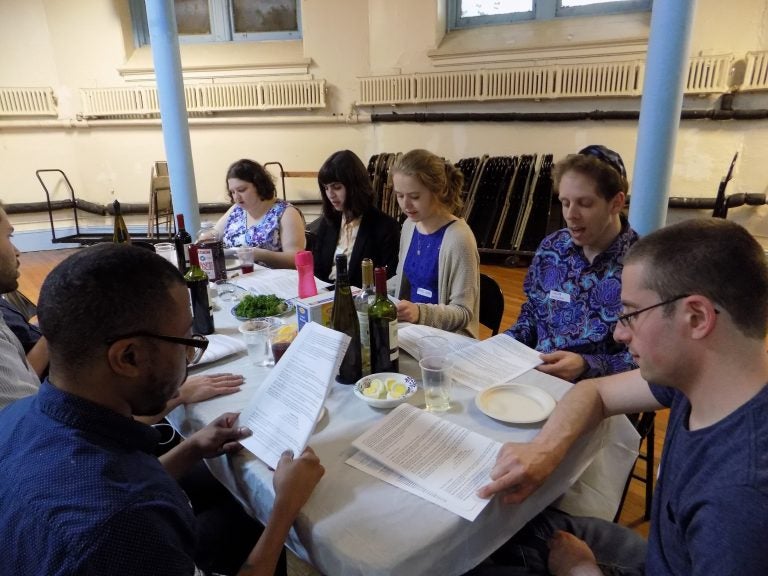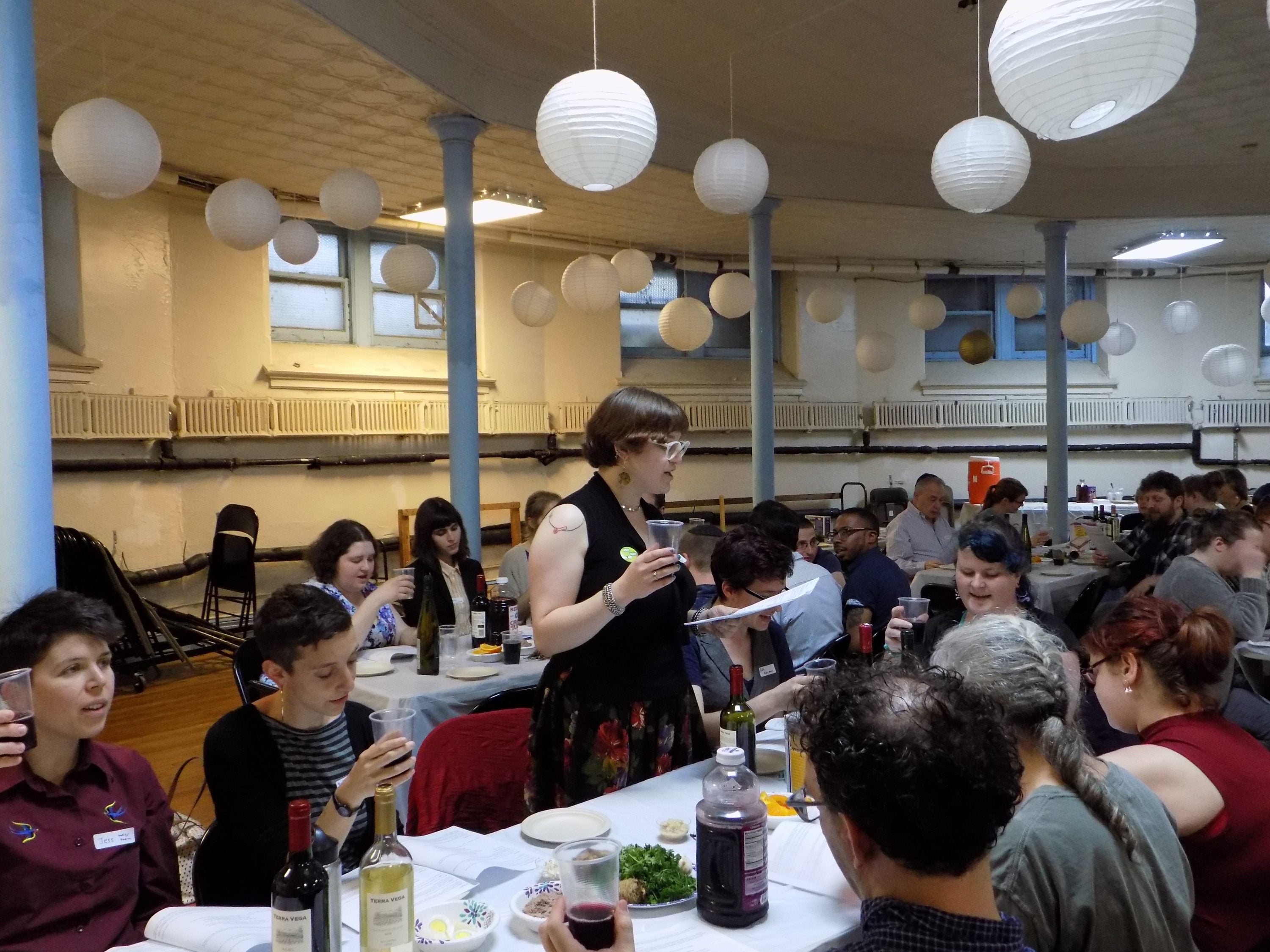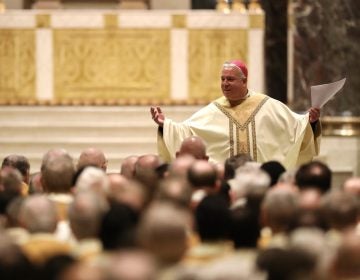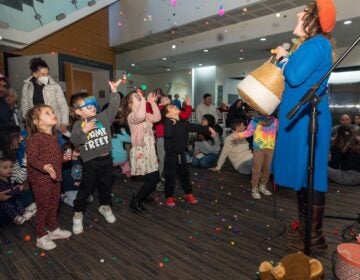A West Philly Passover Seder celebrates its queer Jewish members for the fifth year
Sunday’s LGBTQ Seder went through the traditional steps but used them as a jumping off point to talk about the queer experience.

People attending the LGBTQ Seder read from the Haggadah modified by host Galia Godel to celebrate the queer Jewish experience. (Ximena Conde/WHYY)
A Seder for the LGBTQ community, by the LGBTQ community — that’s what the Kol Tzedek LGBTQ Havurah and J. Proud, a Jewish Philly LGBTQ Consortium, wanted to create Sunday in West Philadelphia.
Seders are ceremonial dinners members of the Jewish faith host on Passover to commemorate and learn about the Exodus story in the Torah — the story of Moses liberating enslaved Israelites from Egypt.
But Sunday’s LGBTQ Community Seder host Galia Godel — a program manager of the LGBTQ initiative at the Jewish Family and Children’s Service of Greater Philadelphia — wanted to focus on more than the Exodus.
“Let all who are hungry, come and eat, and let all who are in need of a queer and trans community find one here, this night,” Godel said, kicking off the Seder hosted at the Calvary Center for Culture and Community.
Seder means order and refers to the series of steps the ritual requires, symbolic of one aspect of the Exodus experience.
Sunday’s LGBTQ Seder went through the traditional steps but used them as a jumping off point to talk about the queer experience.
Take the Maggid, the step where the host tells the history of the Exodus. Godel used this step to also go over the history of the LGBTQ community.
“Queer people of color, trans people, and queer youth still lose their lives at terrifying high rates,” Godel read after talking about Stonewall and the AIDS epidemic. “…Military service and civil jobs are being wrested away from trans folks who want to serve their communities.”
In addition to the usual prayers and singing, the ceremony included reciting the names of 19 transgender people killed in the United States.
While traditionalists in Judaism have remained largely opposed to LGBTQ unions (though some traditionalist congregations make exceptions) the Reform, Reconstructionist and Conservative movements have come out in support of the LGBTQ community. Some synagogues go so far as ordaining LGBTQ rabbis.
Still, Briar Maverick who lives in West Philadelphia said just because Jewish communities aren’t explicitly excluding its LGBTQ members from traditions, it doesn’t mean they’re inclusive.
Originally from Austin, Texas, Maverick doesn’t feel comfortable going to synagogues there.
“Not in the way that I felt I would be turned away, but definitely in the feeling that I had to be just a nice Jewish boy you know, and just have to fit my gender and my experience into this acceptable package,” Maverick said. “And that’s a lot of work.”
Maverick said in many ways this interrupted the spiritual experience and it made Maverick not feel seen despite being welcome to participate in Jewish traditions.
“Having an explicitly queer Seder, really, you know, it goes beyond just being, ‘Sure you as an individual, you as this person, this body, can come.’” Maverick said. “And more knowing all of me is being witnessed, and is being celebrated, and is part of the tradition.”
Godel said while many synagogues open their doors to its queer Jewish members, they might overlook the need for gender-neutral bathrooms or how hurtful it can be to a person when their preferred pronouns aren’t used.
“Or they might say, ‘Yes we would love for these lesbian mothers to bring their children into the religious school, but the application only has space for a father and a mother,” Godel said.

It’s Charlie Hersh’s second LGBTQ Seder. Hersh, who uses the pronouns they/them, is wearing light blue nail polish and a coral lipstick that matches the flowers on their shirt.
They said bringing a queer element to Passover, which is all about liberation and looking to the future, brings new meaning to the holiday.
Hersh said they don’t have many instances where they’ve felt alienated like other Jewish people. They credit the Jewish LGBTQ community they have in West Philly — but said the language in Jewish prayers can be very masculine and excluding.

“Whereas in these kinds of spaces, queer Jewish spaces, you do have that mixture of gendering language and sometimes, even a preference for the feminine language,” Hersh said. “So queen, spirit, and words that don’t necessarily speak to the patriarchal idea of the world or religion.”
For people like Kain Warner, who lives his life as a secular Jew, events like the LGBTQ seder also allow him to get in touch with people like him, without going to temple or synagogue.
Still, Godel and other attendees are quick to say LGBTQ seders are not uncommon in Philadelphia. Godel was at a Seder Saturday where most attendees were queer. But she said these are usually smaller and dependent on the makeup of people’s social circles.
“By building this Seder, I want to make sure that even LGBTQ folks who don’t have a queer social circle will have a place somewhere where that identity is celebrated,” she said.
WHYY is your source for fact-based, in-depth journalism and information. As a nonprofit organization, we rely on financial support from readers like you. Please give today.





